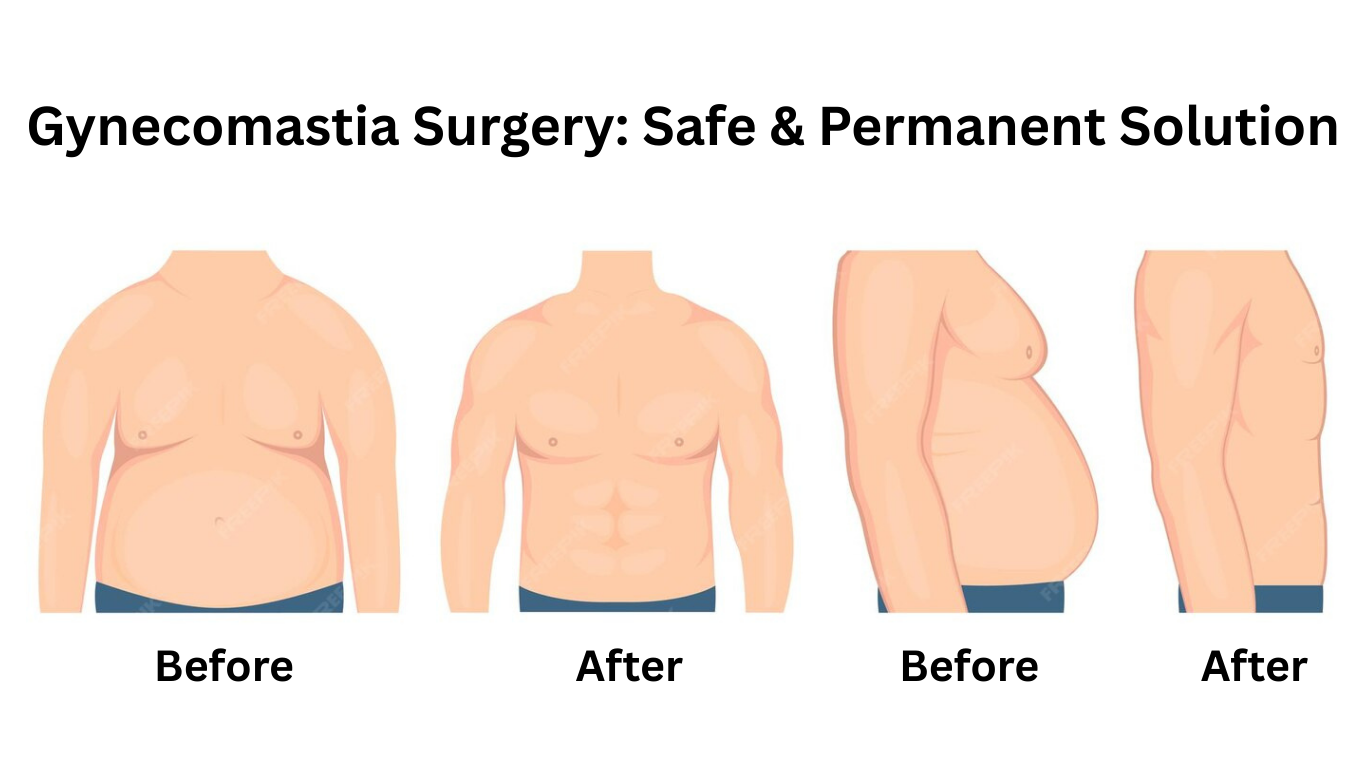
Gynecomastia Surgery in Vizag
Gynecomastia, often referred to as male breast enlargement, is a common condition affecting men of all ages. While it’s not usually harmful medically, it can deeply affect self-esteem, confidence, and overall quality of life. Many men feel embarrassed to wear fitted shirts, visit the gym, or remove their shirts in public. The good news is that at our Gynecomastia Clinic in Vizag, this condition can be treated safely and permanently. With advanced gynecomastia surgery and modern techniques, men can achieve a more masculine chest and renewed confidence.
Gynecomastia is the enlargement of breast tissue in men caused by an imbalance between testosterone and estrogen. This leads to the overdevelopment of glandular tissue, fatty tissue, or both.
It can affect:
Teenagers during puberty
Young adults due to lifestyle or medications
Older men because of hormonal decline
In some cases, chest fat (called pseudo-gynecomastia) looks similar but is caused mainly by weight gain.
At our Gynecomastia Clinic in Vizag, we understand that gynecomastia can develop due to several factors, including hormonal imbalances, medication side effects, obesity, or underlying health conditions.
Hormonal Imbalance: Low testosterone or high estrogen levels.
Puberty: Temporary changes during adolescence.
Obesity: Increases fatty tissue in the chest area.
Medications: Steroids, antidepressants, anti-ulcer drugs, and some heart medications.
Substance Use: Alcohol, marijuana, and certain drugs.
Aging: Hormone production naturally decreases with age.
Medical Conditions: Liver, thyroid, or kidney issues.
Enlargement or swelling of male breast tissue
Firm glandular tissue under the nipple
Tenderness or sensitivity in the chest
Asymmetry (one breast larger than the other)
Emotional stress and loss of self-confidence
Most men with gynecomastia require surgery for long-term correction. The type of surgery depends on whether the issue is caused by fat, gland, or both.
Liposuction: Removes excess fat from the chest area using small incisions.
Excision Surgery: Removes firm glandular tissue under the nipple.
Combination Surgery: Most cases need both liposuction and excision for the best results.
Permanent removal of excess fat and gland tissue
Flat, masculine chest contour
Minimal scars (hidden near the areola)
Boost in confidence and self-image
Quick recovery (return to work in a few days)
Safe and highly effective procedure
Consultation: Physical examination, discussion of medical history, and treatment plan.
Procedure: Performed under local or general anesthesia, usually 1–2 hours.
Recovery:
Compression garment for 3–4 weeks
Mild swelling and bruising for a few days
Return to work in 3–5 days
Full recovery in 3–4 weeks
You may be the right candidate if:
You have persistent male breast enlargement
Exercise and diet haven’t helped
You feel embarrassed or uncomfortable about your chest
You are in good health and at a stable weight
Gynecomastia surgery is generally safe when performed by an experienced plastic surgeon. Risks are rare but may include temporary bruising, swelling, or minor asymmetry. With proper care, results are long-lasting and complications minimal.
Most men experience a significant boost in confidence after surgery. They feel more comfortable wearing fitted clothes, going to the gym, or enjoying social activities without embarrassment. The results are long-lasting, especially when combined with a healthy lifestyle.
Myth: Exercise alone can cure gynecomastia.
Fact: Exercise may reduce fat but not glandular tissue. Surgery is often required.
Myth: Only overweight men develop gynecomastia.
Fact: Even lean men can have gland-related gynecomastia.
Myth: Gynecomastia surgery is unsafe.
Fact: Modern surgical techniques make it safe, quick, and highly effective.
Q1: Is gynecomastia surgery painful?
Mild discomfort is normal, but pain is minimal and well-controlled with medication.
Q2: How long does recovery take?
Most patients return to work in 3–5 days. Full recovery takes about 3–4 weeks.
Q3: Will gynecomastia come back after surgery?
No, the removed gland tissue does not grow back. Maintaining a healthy lifestyle helps prevent recurrence.
Q4: Are the scars visible?
Scars are very small and usually hidden around the areola.
Q5: Can teenagers get gynecomastia surgery?
Yes, but usually after puberty when hormonal fluctuations settle.
Gynecomastia is a common but treatable condition. If you’re struggling with male breast enlargement, you don’t need to suffer in silence. With safe and advanced gynecomastia surgery, you can achieve a flat, masculine chest and restore your confidence.
Book a consultation with our expert plastic surgeon today and take the first step towards a new, confident you.
Helpful, much appreciated.
Way cool! Some very valid points! I appreciate you penning this article and also the rest of the website is also really good.